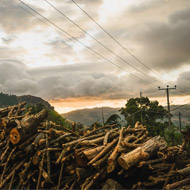
Study finds highways and cities occurring inside protected areas
A third of the world’s protected areas are being destroyed by humans, according to new research.
The study, published in the journal Science, found that six million sq km of protected land is in a state unlikely to preserve endangered biodiversity. The greatest impacts were seen in areas of high population density, such as Asia, Europe and Africa.
The research was carried out by the University of Queensland and the Wildlife Conservation Society. PhD candidate Kendall Jones described the scale of damage in some places as striking.
“We found major road infrastructure such as highways, industrial agriculture, and even entire cities occurring inside the boundaries of places supposed to be set aside for nature conservation,” he said. “More than 90 per cent of protected areas, such as national parks and nature reserves, showed some signs of damaging human activities.”
In the study, researchers used the Human Footprint Index to analyse human activity across thousands of protected areas. The index is the most comprehensive global map of human pressure on the environment and expresses, as a percentage, the relative human influence on the surface of the land.
The researchers found that large, heavily protected areas were under much less pressure than smaller protected areas where more human activity is permitted.
Professor James Watson from the University of Queensland said well-funded, well-managed and well-placed land protection areas were highly effective in halting threats to biodiversity.
“There are also many protected areas that are still in good condition and protect the last strongholds of endangered species worldwide,” Professor Watson said. “The challenge is to ensure those protected areas that are most valuable for nature conservation get the most attention from governments and donors to ensure they safeguard it.”
He is now calling on conservationists to hold the governments to account so they take the conservation of their protected areas seriously.



 The British Equine Veterinary Association (BEVA) is to allow its registered veterinary nurse (RVN) members the right to vote.
The British Equine Veterinary Association (BEVA) is to allow its registered veterinary nurse (RVN) members the right to vote.